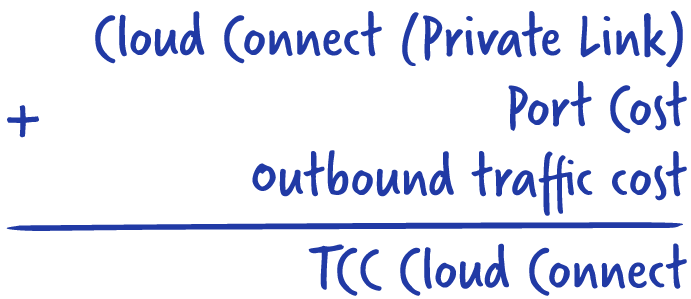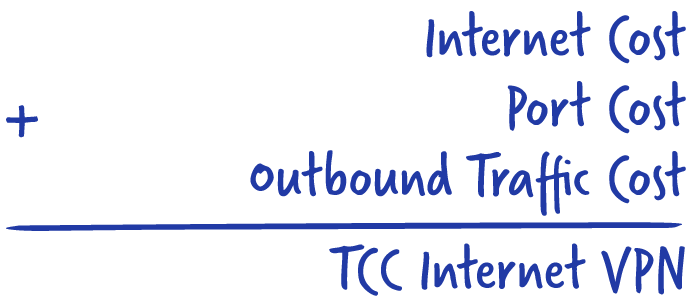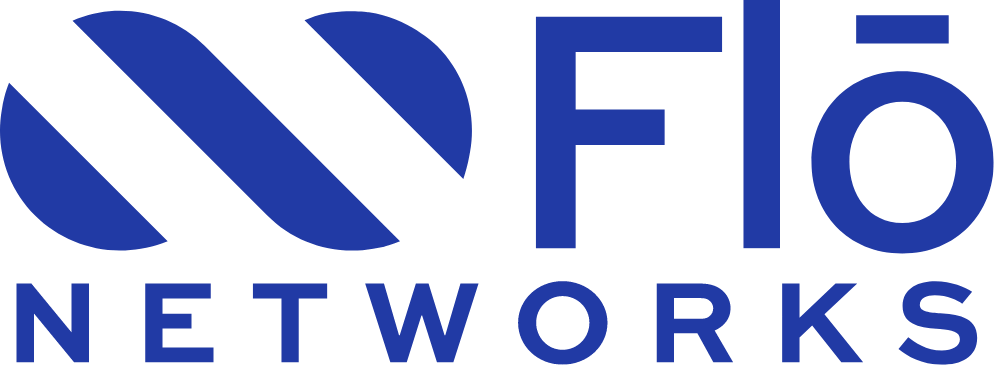When we compare the cost structures between private cloud connectivity (Cloud Connect) with a VPN connection to the Internet, we can see a clear economic advantage in dedicated private connections without focusing on technical conveniences.
You may find difficult to calculate the costs of connectivity to public clouds, and we believe this topic has not received the attention it deserves. However, that’s why Flō Networks customers can get an additional advantage, in addition to our company’s high availability and data transfer times.
Cost of connectivity to the public cloud
The cost of Flō Networks Cloud Connect, our dedicated connectivity to public clouds, is simple: A monthly fee based on the contracted bandwidth, with the possibility of scaling it as required, with the flexibility that our customers deserve.
The client will be charged for the contracted bandwidth if its Internet connection is through a VPN (Virtual Private Network).
There are other costs associated with connectivity charged by public clouds such as AWS, Azure, or Google Cloud. The fees may vary from one cloud to another, but they share a similar structure.
Port Cost
This is an hourly rate to use the port. When there’s a dedicated connection, the fee will change according to the port’s bandwidth, while VPN connections get a fixed fee regardless of the bandwidth.
Outbound traffic cost
All cloud providers allow you to upload as much data to their infrastructure as you need, but they charge a cost per gigabit when you download it from their data centers.
Every cloud provider have different rates, but one thing is always true: This cost is much lower using Cloud Connection than a VPN in most cases.
In some edge cases, this rate can cost for VPN as much as four times the cost of a dedicated connection.
This value becomes more relevant when calculating the Total Cost of Connectivity (TCC) since it’s correlated to bandwidth.
Total Cost of Connectivity (TCC)
As mentioned above, when evaluating the total cost of connectivity, there are two slightly different equations:
1. If we use a dedicated connection, like Flō Networks’ Cloud Connect solution:

2. If we connect through a VPN:

The cost of a VPN becomes more expensive as outbound traffic increases, while the total cost of Cloud Connect connectivity becomes cheaper.
Depending on the cloud provider, there’s a threshold between 100 MB and 200 MB in which going for a dedicated connection is best without considering the benefits of having a dedicated connection to the cloud.



These charts are aligned with the bandwidth recommendations of cloud providers to use dedicated private links (above 200 Mbps). However, these recommendations don’t come for cost reasons but for the added privacy, quality of service, and security.
We obtained these calculations based on market prices for a conservative link utilization rate of only 25% or 180 hours per month, equivalent to weekday usage during business hours. Assuming these are usage rates closer to business reality, the convenience of Cloud Connect results in even lower bandwidths.
No matter which major cloud provider you choose, connecting through Cloud Connect will result in significantly reducing outbound traffic charges. But that’s not all the benefits of a dedicated connection to your cloud data.
As you can see in the following table, the benefits range from reliability to security.
Internet VPN
-
Lack of performance guarantees, cloud route service level not available. Not recommended for production systems or Mission Critical Applications
-
Transfer of large amounts of data over VPN can tends to be expensive and slow
-
Not recommended by Cloud providers for connections over 200 Mbps
-
Lack of flexibility for bandwidth growth
-
Security limitations with potential exposure to DDoS attacks
-
Not scalable, limited to 500 Mbps in most clouds
Cloud Connect by Flō Networks
-
SLA available. Ideal for production systems and Mission Critical Applications
-
Allows businesses to transfer and access data directly from their data center, offices, or public cloud, avoiding network congestion
-
Predictable and reliable performance up to +100 Gbps
-
Ease to add more capacity and new cloud providers
-
Intrinsec security. E2E encryption options. Enables credit card transactions under PCI 3.2 standards
-
Scalable according to customer needs
With all the benefits in mind, and considering it implies a cost reduction for most businesses, getting a private connection to the cloud is a no-brainer. Consider doing it with Flō Networks, and get the flexibility, nimbleness and scalability your business needs to move forward.

